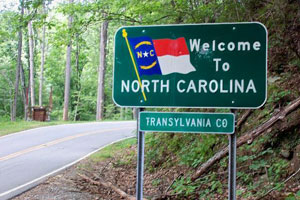No Easy Pass for North Carolina’s First Privately Run Toll Lanes

North Carolina signed contracts and sold $100 million of municipal bonds, workers are surveying the land and the state’s first private toll lanes are set to open on Interstate 77 in 2018.
Not if Kurt Naas has anything to say about it. Naas and a group of fellow Charlotte-area residents have filed suit to stop the $648 million plan for the state’s first highway project with a private operator, a subsidiary of Madrid-based Ferrovial SA. The residents have spurred a chorus of opposition that includes local business leaders and the government of Mecklenburg County, where the stretch of highway is located.
“We’re siphoning money out of our local economy, and we’re sending it to a foreign company,” said Naas, 53, an engineer and resident of Cornelius. “Giving the public right of way and using public dollars to build private lanes is bad public policy.”
The push for such public-private partnerships — or P3s — is expanding across the nation, from North Carolina to Colorado and Texas, as localities face dwindling federal dollars to fix crumbling roads through the almost-broke Highway Trust Fund.
“The Highway Trust Fund is just going from deadline to deadline, without long-term certainty regarding funds,” said Dan Close, a money manager in Chicago at Nuveen Asset Management, which oversees about $100 billion of munis, including the North Carolina securities. “When you need critical infrastructure completed, P3 projects are offering a little bit more certainty.”
Private financing of public works is common in Europe and Canada, with companies handling the work on the assets while governments retain ownership. It’s less so in the United States, where the Highway Trust Fund was established in 1956 to support the new Interstate Highway System.
But the fund is almost out of money, supported by a federal gasoline tax that hasn’t been raised since 1993 and with lawmakers bickering over how to fill the gap.
So, governments are turning to other sources of financing.
In North Carolina, a venture called I-77 Mobility Partners , led by Ferrovial subsidiary Cintra Infraestructuras and Aberdeen Global Infrastructure II, will design, build, operate and maintain the I-77 project for 50 years.
The company, which is investing $248 million, will collect revenue from the new toll lanes on a 26-mile stretch of the highway north from Charlotte.
The state Department of Transportation sold the municipal bonds in May. The sale included securities maturing in June 2026 yielding 3.72%, or about 1.4 percentage points over benchmark munis, according to data compiled by Bloomberg News. An index of 10-year BBB revenue-backed munis yielded 3.27% that day, Bloomberg data show.
Fitch Ratings graded the bonds BBB-, one step above junk, citing the project’s vulnerability to less traffic during economic downturns and the area’s “limited familiarity with tolling.” DBRS Ltd. graded the securities BBB, one step higher.
Levies will change based on demand, and travelers can either use those lanes and pay, or drive on the free lanes. Vehicles with more than three occupants can ride on the new lanes without charge. The state is paying about $95 million toward the cost, and a federal loan to the company provides $189 million.
The project will create “8,000 direct, indirect and induced jobs” with as many as 100 local companies expected in the construction, said Jean Leier, a spokeswoman for I-77 Mobility Partners.
“This long-term traffic solution will generate economic development and continued economic vitality to this important corridor,” she said in an e-mail.
Partnering with a private operator speeds up a project needed to cope with the congestion in a fast-growing area, said Mike Charbonneau, a spokesman for the state Department of Transportation in Raleigh.
Charlotte, the state’s most populous city, is home to Bank of America Corp. and Duke Energy Corp., the biggest U.S. electric utility. Surrounding Mecklenburg and Iredell counties make up 16% of the state’s employment, according to Fitch.
“While P3s are new to our state, they are an important strategy moving forward to help meet growing demands and to stay ahead of rapid growth,” Charbonneau said by e-mail.
Representatives of local businesses see the project as worsening traffic and are traveling to Raleigh on June 30 to meet with legislators to persuade them to cancel the transaction, said organizer John McAlpine. He said drivers would eschew tolls, while operators of trucks with more than three axles —which can’t use the paid lanes —would throng the free ones.
Mecklenburg County also wants to curb the project. Its board of commissioners voted 7-2 on June 16 on a resolution asking state leaders to cancel it and come up with an alternative without tolls.
The transportation department filed a motion this month in Mecklenburg County Superior Court asking that the suit by Naas’s group be dismissed.
With no solution in sight for long-term federal funding of roads, more localities are considering P3 projects, testing American acceptance of tolls, said Jonathan Gifford, director of the Center for Transportation Public-Private Partnership Policy at George Mason University in Arlington, Virginia.
“That’s a bit of a wild card,” Gifford said. “There’s a widening appreciation for the fact that the public acceptance of using tolls to finance the projects is pretty variable.”

